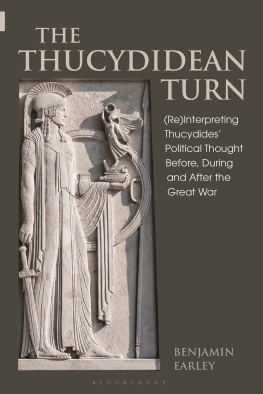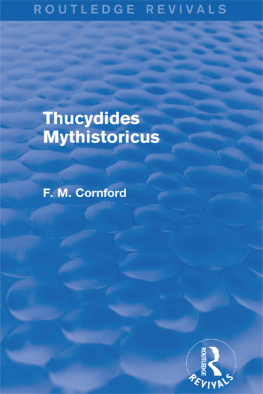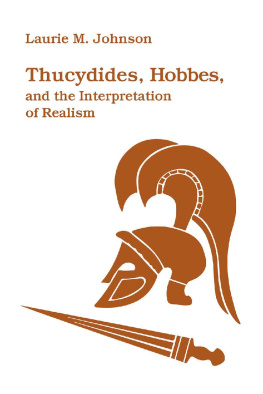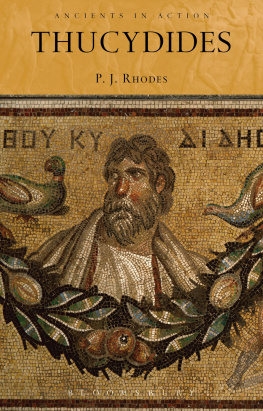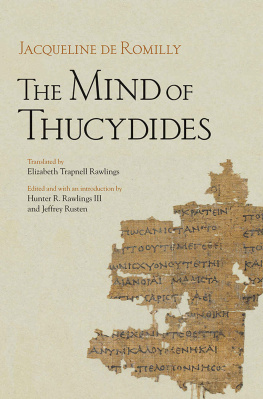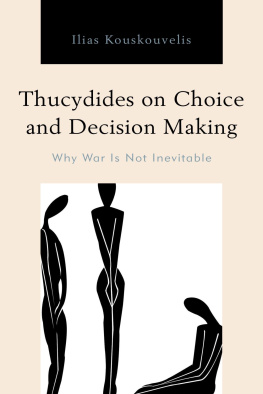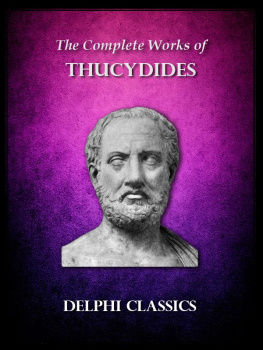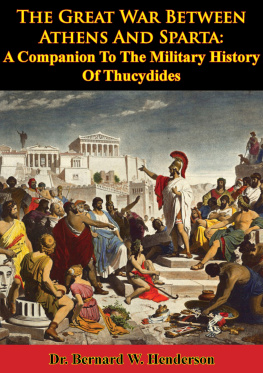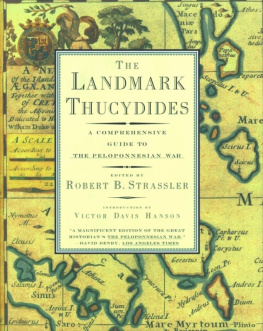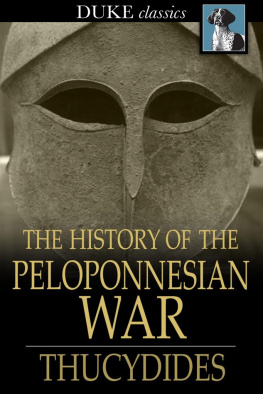
The Thucydidean Turn
To my Grandmother
Bloomsbury Studies in Classical Reception
Bloomsbury Studies in Classical Reception presents scholarly monographs offering new and innovative research and debate to students and scholars in the reception of Classical Studies. Each volume will explore the appropriation, reconceptualization and recontextualization of various aspects of the Graeco-Roman world and its culture, looking at the impact of the ancient world on modernity. Research will also cover reception within antiquity, the theory and practice of translation, and reception theory.
Also available in the Series:
Alexander the Great in the Early Christian Tradition: Classical Reception and Patristic Literature, Christian Thrue Djurslev
Antipodean Antiquities, edited by Marguerite Johnson
Classics in Extremis, edited by Edmund Richardson
Frankenstein and its Classics, edited by Jesse Weiner, Benjamin Eldon Stevens and Brett M. Rogers
Greek and Roman Classics in the British Struggle for Social Reform, edited by Henry Stead and Edith Hall
Greeks and Romans on the Latin American Stage, edited by Rosa Andjar and Konstantinos P. Nikoloutsos
Homers Iliad and the Trojan War: Dialogues on Tradition, Jan Haywood and Naose Mac Sweeney
Julius Caesars Self-Created Image and Its Dramatic Afterlife, Miryana Dimitrova
Once and Future Antiquities in Science Fiction and Fantasy, edited by Brett M. Rogers and Benjamin Eldon Stevens
Reading Poetry, Writing Genre, edited by Silvio Br and Emily Hauser
Sex, Symbolists and the Greek Body, Richard Warren
The Codex Fori Mussolini, Han Lamers and Bettina Reitz-Joosse
The Classics in Modernist Translation, edited by Miranda Hickman and Lynn Kozak
The Gentle, Jealous God, Simon Perris
Translations of Greek Tragedy in the Work of Ezra Pound, Peter Liebregts
Victorian Epic Burlesques, Rachel Bryant Davies

Contents
This book has four main aims. The first is to offer a comprehensive account of the principal texts in the British reception of Thucydides in the early twentieth century (specifically the period from 1900 to 1939). This account is important because it is only then that Thucydides role begins to shift from that of a historiographical colleague and model to that of the archetypal political thinker, theorist and philosopher in the scholarly imagination. I have labelled this moment the Thucydidean turn because it is characterized by individual scholars discovering Thucydides contemporary relevance under the influence of the Boer War and the Great War. I discuss in turn and at length the writings of key British thinkers in this turn to Thucydides, namely Francis Cornford, George Abbott, Alfred Zimmern, Arnold Toynbee and Enoch Powell. While there was important material produced on the continent, for example by Eduard Schwartz and Albert Thibaudet, it was in Britain that the contemporary relevance of Thucydides was most keenly felt and had the most impact on subsequent scholarship. No such survey of this critical moment in the reception history of Thucydides has yet been attempted. Neville Morleys monograph Thucydides and the Idea of History (2013) is, of course, a classic in the field, and I cannot hope to emulate his range or scholarship, but this work focuses almost exclusively on Thucydides in the history of historiography. Greater light has been thrown on Thucydides and the history of political thought in various essays written for collected volumes edited by Morley with Kathleen Harloe (2012) and later with Christine Lee (2015). However, these individual essays have tended to focus on the reception of Thucydides thought within the writings of one particular author or a discrete period. Little has been written on the transition between Thucydides as the father of historiography and Thucydides as the father of International Relations, as he is often known today. I claim, therefore, that the turn is a moment of crucial importance in the reception history of Thucydides.
The second aim is to offer a reconsideration of the reception of Thucydides in the history of International Relations. My analysis of the turn also marks a significant departure from previous thought on the place of Thucydides in the history of that discipline. In many standard histories of International Relations, Thucydides, alongside Machiavelli, Hobbes, Kant and others, is held up as a practitioner of the discipline before its formal establishment in 1919 (see, for example, Knutsen 1997; Donnelly 2000). More recently, Jeanne Morefield (2014) and Edward Keene (2015) have pointed to the important place of Alfred Zimmern and Arnold Toynbee in the transmission of knowledge about Thucydides from Classics to International Relations. Both men began by studying Classics but found themselves key figures in the establishment of the latter discipline following the carnage of the Great War. Recent scholarship has, therefore, done much to improve our knowledge of the passing of Thucydides from one discipline to the other. What is much less well known is how Classicists themselves were opening up new avenues of research and producing new interpretations in the wake of the Boer War and the Great War and how important this work would prove to subsequent Thucydidean scholarship. This book will fill that lacuna. It will argue that under the influence of these wars a number of British thinkers turned to Thucydides account of necessity in human affairs, political psychology and realism to make sense of their own shattered world. These paradigms of interpretation came to dominate the twentieth- and twenty-first-century reception of Thucydides in both Classics and International Relations. The emergence of the British turn to Thucydides was, therefore, necessary for the subsequent establishment of the Athenian historian as one of the greatest thinkers in the American tradition of International Relations after the Second World War.
My third aim is to analyse and critically engage with the arguments of these British scholars for the contribution that they might make to Thucydidean scholarship today. I have pursued this aim in two ways. First, I have explored how certain interpretations have influenced subsequent scholarship down to today. For example, how Cornfords idea of Thucydides as a tragedian influences scholarship for the subsequent century or so. Second, I have compared and contrasted early twentieth-century interpretations with those current today. For example, Powells depiction of Thucydides as a Realpolitiker was almost entirely forgotten after the Second World War but shows significant similarities (and differences) with contemporary realist interpretations of the History. While each of the scholars I study in this book read Thucydides in unique ways, there is an overarching theme which unites them: the relationship between political psychology (of both the individual and the polis) and historical change. Cornfords tragic and Powells Realpolitik interpretation both point, in different ways, to the importance of various iterations of political psychology in Thucydides. Both scholars, however, also point to the number of connections between political psychology and the causes of the Peloponnesian War, the conduct of the poleis while engaged in the conflict, and the rise and fall of states. These interpretations speak in important ways to the recent interest in the emotions (Visvardi 2015; Fragoulaki 2016), the ways in which different actors display different psychologies in Thucydides (Lebow 2001; Zumbrunnen 2015), and the ongoing debate over necessity and change in the
Next page
